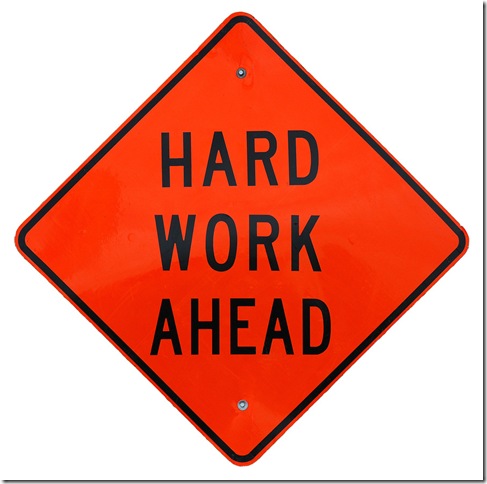Work Ethic: What is it and do you have it?
Sabbatical from Writing About Job Search
Brad and I are back after a month-long sabbatical where we’ve been working our hearts out preparing for 2011. We’ve got so many initiatives underway, including a couple of new e-books, an entire on-line learning university, a job board for $100k plus job seekers.
A lot of people tend to think of December as a down month, a month to kick back, relax, take time off, not work very hard. For Brad and I, this was a very busy December and we’re excited about the job market and hiring possibilities in 2011.
What is Hard Work?
Onto the real blog subject – what is hard work?
Candidates claim they have a high work ethic.
Employers desire candidates with a high work ethic.
Why do I want to tackle this subject? It came up in conversation with my girls HS basketball team the other day. We were discussing why we win sometimes and why we lose.
I told the girls that most of the teams we play are evenly matched with us in skill. Sometimes we win because we play with a higher work ethic than our opponents, and conversely sometimes we lose because we have a lower work ethic than our competitors on the basketball court.
Is Hard Work the same as Work Ethic?
How do I define work ethic – I define it as outworking those around you. Those around you could be your co-workers, your teammates, the opposing team, a project team – any group of people who are competing with you for attention, rewards, recognition, influence, promotions, more money, more playing time, etc.
Many of these other people are smarter than you. It doesn’t matter. In the end, outworking others will usually trump pure intelligence and educational background every time. It’s not what you bring to the table in a game or at work – it’s how you apply it in getting results.
Usually the people who have a high work ethic, or who outwork their peers have a variety of traits that support and reinforce their ability to outwork everyone around them. These traits include being proactive, showing initiative, working longer hours, being the first one to turn on the lights in the morning, and the one who turns the lights out at night, doing more than you’re asked to do, going the extra mile, anticipating what needs to be done, and bouncing back from set-backs and adversity with renewed energy.
Who works hard and who doesn’t?
I’m going to suggest that less than 5% of the population has a high work ethic or demonstrated ability/desire to outwork those around them. I’m not referring to workaholics nor am I referring to compulsive disorders. These top achievers simply work harder than everybody else.
The other 95% of the population is satisfied or complacent with being average or mediocre.
A few tough questions about working hard
Where are you on the spectrum from complacent to “outwork everyone”?
Could you offer examples and illustrations in an interview to demonstrate how your work ethic/ability to outwork others – is head and shoulders above your peers? Do you stand a chance of getting a job in a tight job market if you can’t demonstrate these traits?
Perhaps this blog has challenged your conventional thinking about the term work ethic – where most people associate work ethic with the willingness to work long hours – which is a small element of outworking other people.
Who is your role model for outworking others?
Barry Deutsch






